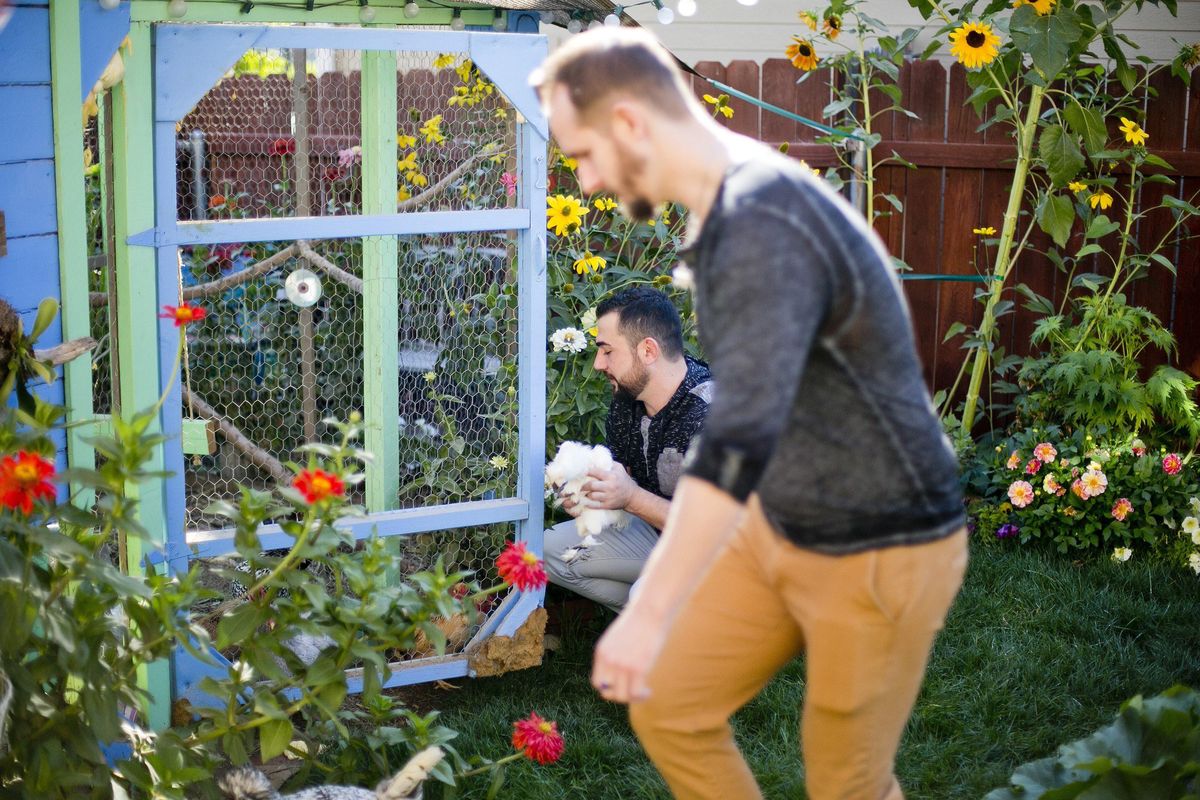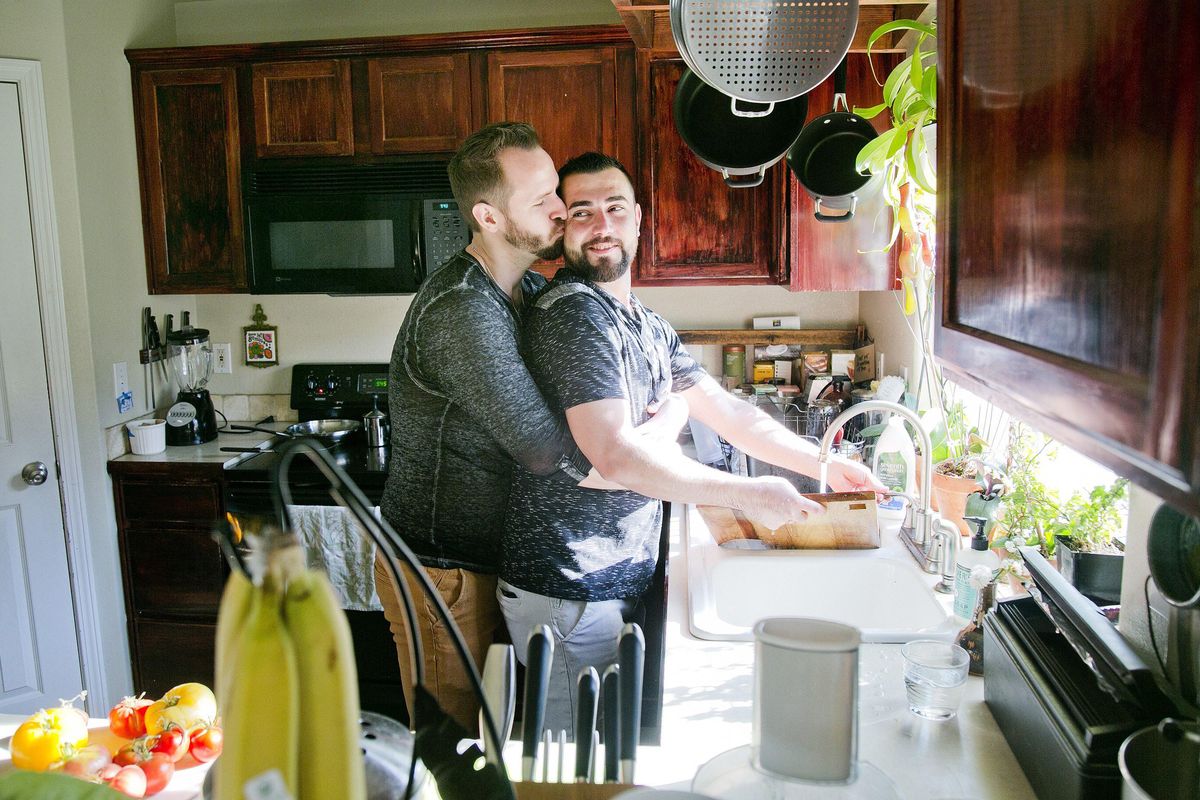Boise takes in more Syrian refugees than New York and L.A. combined
Shadi Ismail, rear, and boyfriend Ian Guthrie gather chickens in the backyard of their home Sept. 9 in Boise. (Kyle Green / Idaho Statesman)
WASHINGTON – Despite resistance by Idaho’s top political leaders, 118 Syrian refugees have moved to the Gem State since last Oct. 1, all of them settling in Boise, according to new data from the State Department.
Compared with larger cities, Boise took in a disproportionate share, accepting more than twice as many refugees as New York, with nine, and Los Angeles, with 45, combined.
No one’s more excited to welcome the newcomers than Shadi Ismail, 29, who left Syria in 2012 and ended up in Boise.
“It’s good, very good news – people coming in, being safe now,” he said. “They will have life.”
While the new refugees are fleeing Syria’s civil war, Ismail feared his family would kill him for being gay. He decided to leave his homeland after his father and brother burned him with charcoal, trying to rid him of his homosexuality.
“Here in America, you don’t have to be afraid,” Ismail said. “You walk in the street and nobody will kill you because of whatever religion you are or because you’re gay.”
Overall, the United States had admitted 11,469 Syrian refugees as of Sept. 9, according to the State Department’s Bureau of Population, Refugees and Migration.
While the resettlement effort got off to a slow start, the Obama administration has now exceeded its goal of taking in at least 10,000 Syrian refugees by Sept. 30, the end of the government’s fiscal year.
Washington state admitted 150 of the refugees, most of them landing in Spokane and Seattle.
But no state took in more Syrian refugees than California, with 1,300. San Diego accepted more than half of them, or 690, while Sacramento ranked second among cities, with 240.
In Idaho, Syrians make up more than 11 percent of the 1,048 refugees who’ve moved to the state from all countries this fiscal year.
Officials said Boise’s relatively low cost of living and long reputation as a welcoming location had been a big draw for the Syrian refugees, who have resettled in 231 cities and towns across the U.S.
“Places like New York and L.A. are sometimes harsh environments to place people into, ” said Jan Reeves, the director of the Idaho Office for Refugees in Boise.
Like all refugees, he said, the Syrians have tackled big challenges – often learning a new language and how to navigate in unfamiliar surroundings – with few connections. But, he said, “The experience has been very positive for most.”
“Syrians are experiencing the same adjustment as anyone else would and are working hard to get a start on a new life in America,” Reeves said. “It’s always a daunting experience for refugees to come to a new place and start over with nothing.”
Julianne Donnelly Tzul, the executive director of the International Rescue Committee in Boise, said most of the Syrian refugees had been recent arrivals who faced a “whirl of appointments,” including medical checkups, finding apartments and signing leases, looking for jobs and getting Social Security numbers, school tours and enrollments, cultural orientation and language screening, and updating immigration records.
“The first few weeks are full of both an intense number of tasks and appointments and, frankly, shock,” she said.
Asmaa Albukaie, a Syrian refugee and a single mother who moved to Boise two years ago with her two teenage sons, said the adjustment had been complicated by politics, especially Republican Donald Trump’s call to ban Muslims from entering the country temporarily amid fears they’d not been properly vetted.
“He’s giving a wrong idea,” she said. “And if he will be the president of the United States, how come he doesn’t read? How come he doesn’t know we have the paperwork? We come legally.”
Albukaie, 33, said she no longer watched American television because Syrians routinely were shown as terrorists and members of the Islamic State.
“I hate TV because it gives me bad energy, especially political stuff and news,” she said. “We are normal families that just need a safe place. We’re not coming here to fight and we are not coming here to destroy the country.”
Obama’s plan to admit the refugees set off an immediate firestorm, with critics fearing that terrorists would sneak into the country by exploiting screening gaps.
Last November, after a coordinated series of terrorist attacks in Paris, many Republicans urged Obama to halt the resettlement after revelations that one of the bombers had a Syrian passport.
Idaho Republican Gov. Butch Otter wrote a letter to the president, saying the program needed review and that “frustration with the federal immigration and refugee program runs high” in his state.
Otter won unanimous backing from Idaho’s all-Republican congressional delegation, with Sens. Mike Crapo and Jim Risch and Reps. Mike Simpson and Raul Labrador calling for suspending the program.
Crapo said he had strong concerns about vetting, while Risch said he had serious reservations about safety guarantees. Neither has changed his mind since last fall, their spokesmen said.
Labrador is awaiting a House of Representatives vote on his bill that would give Congress, not the president, the final say in how many refugees can legally resettle in the U.S. When the House Judiciary Committee approved the legislation in March, Labrador said the new law was needed because Americans “do not know who these people truly are” and states lacked the power to block a president’s plans. His spokesman, Dan Popkey, said Labrador still “opposes the entry of any refugees without assurances that they are not terrorists aiming to kill Americans.”
Simpson said the State Department and the Department of Homeland Security still needed to communicate “a clear plan for a screening process for Syrian refugees” that was stringent and thorough.
“The real problem is the American people have lost confidence in this administration’s ability to keep us safe,” Simpson said.Reeves said the opposition from Republicans in Congress represented a noticeable shift in recent years: “The support that was once largely bipartisan has virtually disappeared.”
But he said local support had grown: “My experience has been that as the people of Idaho meet and get to know refugees from all over the world, including from Syria, they develop admiration and respect for fellow human beings who share their values of freedom, family and opportunity.”
On Sept. 1, Democratic Boise Mayor David Bieter saluted the city’s decadeslong embrace of newcomers in his 2016 State of the City address, showing a video of refugees and noting that “many of the most loyal and authentic Boiseans weren’t born here or even in the U.S.”
Albukaie said her sons, now 16 and 17, had not always felt safe in Boise, especially after one of them was assaulted last February. She said the attacker had hit the boy in the face after asking whether he was Muslim.
But Albukaie, who now helps other refugees resettle as a case manager for the Agency for New Americans in Boise, said she had come to “love the United States so much” and was eager to help the new Syrian arrivals adjust.
“Everything is different in my country,” she said. “When I arrived, I didn’t have any community. I didn’t have any Syrians around me. … I am so excited.”
So is Ismail, who now works as a manager at a food-processing plant and lives with his California-born boyfriend, Ian Guthrie, a massage therapist whom he met at The Balcony Club, a gay bar in downtown Boise.
On his first day in the city, Ismail said, he rode his bike downtown but got lost trying to find the office of a refugee resettlement group. He couldn’t speak English but showed a map to a stranger, pointing to where he wanted to go. He said the woman had taken him by the hand and led him to his destination.
“Really, this will be in my memory all the time,” Ismail said. “I will never forget to my death.”
Now he’s eager to offer advice to other newcomers from Syria.
“Guys, the system here helps you get on your feet, not just sitting at home and smoking hookah and do nothing,” he said. “This is what happened to me. … Just be yourself and love this city, because the city will love you back.”

